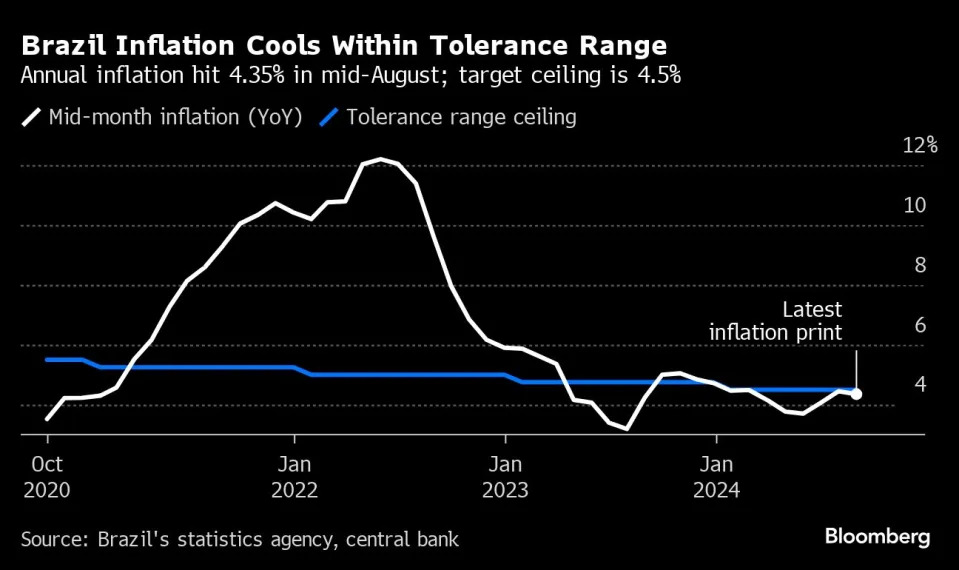(Bloomberg) -- Brazil’s annual inflation cooled roughly in line with expectations in early August, providing limited relief to a central bank that’s under sustained pressure to raise interest rates.
Official data released Tuesday showed prices increased 4.35% in the first two weeks of August from a year earlier, just above the 4.33% median estimate from analysts in a Bloomberg survey. On the month, inflation stood at 0.19%.
Latin America’s biggest economy is running hotter than policymakers would like. Despite the drag of double-digit borrowing costs, gauges of activity have blown past forecasts, while consumer spending and hiring remain strong.
Those factors have led investors to bet the central bank, which hit the brakes on an easing cycle in June, will soon have to start increasing borrowing costs to counter inflation expectations that are running above the 3% target.
Swap rates on the contract due in January 2026, which are an indicator of market sentiment toward monetary policy at the end of next year, rose 7 basis points in morning trading after inflation came in just above estimates. Traders are pricing in a borrowing cost increase of at least 25 basis points at September’s rate-setting meeting.
A 0.83% monthly jump in transport costs on the back of nationwide hike in gasoline drove price gains in the first two weeks of August. Rising education costs, which climbed 0.75% on higher tuition fees, were also a top contributor. On the other hand, consumers saw some relief as food and beverages fell 0.8%, the statistics agency said.
September Meeting
The unsteady path of inflation in recent months has further complicated analysts’ ability to forecast the next move of the central bank’s board, known as Copom, when it convenes in September.
Kimberley Sperrfechter, an emerging markets economist at Capital Economics, said that while the decision will be a close call, Tuesday’s data should be enough to stave off a rate hike for now.
“On balance, the fall in inflation in the first half of August, alongside the Fed’s seeming confirmation that it will kick off its easing cycle in September, mean that it’s a bit more likely that Copom will leave rates unchanged at 10.5%,” she wrote in a research note.
Still, Roberto Campos Neto, the head of the monetary authority, acknowledged over the weekend that cooling price growth had become a more difficult task in Brazil, saying a tight labor market had made it challenging to maintain a streak of disinflation.
“How do you continue this process with labor tightness?” he said at the Kansas City Fed’s annual conference in Jackson Hole.
Investors have also expressed concerns about President Luiz Inacio Lula da Silva’s fiscal approach, and are watching closely for signs of how his eventual pick for the next central bank head will handle inflation. Lula is expected to choose a successor for Campos Neto, whose term ends later this year, in the coming days.
In public appearances, Gabriel Galipolo, the central bank’s monetary policy director and a top candidate to lead the institution, has said that all options, including a hike, are on the table for the next interest rate decision in September.
--With assistance from Giovanna Serafim.
(Updates with market impact, inflation details and analysis beginning in fifth paragraph.)


